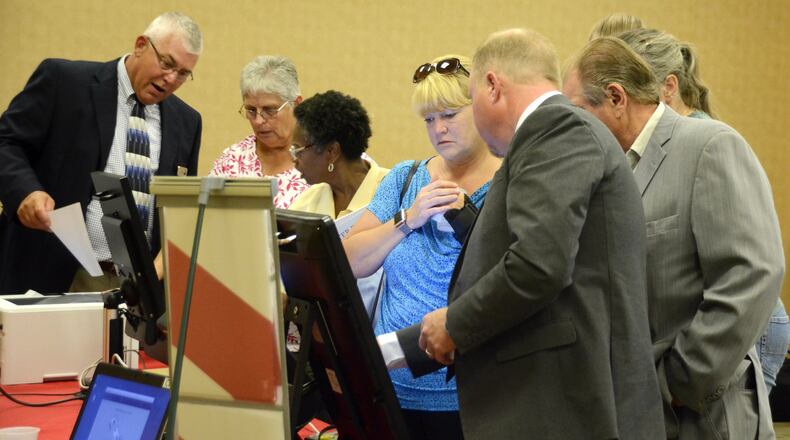Right now, County Administrator Charlie Young said the money is not in the budget to fund a new system. He said the administration is still in a “discovery phase” before a decision is made to purchase what potentially could be a $3 million to $6 million purchase.
“We’re well aware that the election equipment has to be replaced,” Young said, but added that he appreciates the efforts made by the board of elections’ information technology staff making the machines are accurately working and has offered the administration’s information technology staff for assistance if needed.
Work to ensure voting machines are running properly includes using parts from broken machines and keeping unused machines ready at a moment’s notice. Not all of the county’s 1,600 voting machines are used in any given election.
Voting machines undergo strict tests before the voting public uses them, according to the Ohio Secretary of State.
Manufacturers must have machines tested by a voting assistance test lab that is certified by the United States Elections Assistance Commission. Through that process, machines are certified by the commission. Then on an ongoing basis, counties are required to perform Logic and Accuracy Testing — also known as “pre-election testing” — prior to every election.
Young said the commissioners are open to reconsider giving the OK to buy new voting machines before 2019 — a date offered by Ohio Secretary of State Jon Husted — funding a new system sooner if Ohio lawmakers reconsider the decision to eliminate funding from the state’s biennium budget approved in June. County election officials wanted to have new election machines for the 2018 November gubernatorial election, but in place by the May 2018 primary election.
“I respect have have total faith in our commissioners as to when fiscally a new voting system would be approved for the Board of Elections,” said elections Director Diane Noonan. “The commissioners have always supported us.”
The Butler County Board of Elections last month brought in five vendors to test six types of machines that could be the successor of the current system, Deibold TSX, which was purchased in 2005 (two years before the iPhone was debuted) but were manufactured in 2000.
In the past five elections held in Butler County — three general elections, one primary and one special election — there were 118 double votes, according to records provided by the Butler County Board of Elections. Those occurred when problems occurred, such as a machine freezing, and a poll worker re-issued a new ballot and had those voters vote again. Nearly 90 of those double votes occurred in the March 2016 primary and the November 2016 general elections.
The Butler County Board of Elections has around 1,600 machines but there are 149 unusable voting machines, and on average 50 voting machines need repaired after each election, according to the elections office.
Jay Klein, Butler County Board of Elections database administrator, wrote to the two elections office directors that his confidence level with the current system “is decreasing” and says the county has upgraded operating systems “at least three times since these machines were made.”
But Young said more data, including anecdotal data, is needed, including failure rates. He also said the vendor of the voting machines “has assured us they have no plans to not support the system.”
Husted said replacing voting equipment “remains a priority,” according to Sam Ross, spokesman for Husted’s office.
“Our office has engaged legislators — who in the most recent budget process showed their interest in pursuing a workable solution — and stakeholders, such as the County Commissioners Association of Ohio and the Ohio Association of Election Officials, to determine a path forward,” he said.
About the Author

